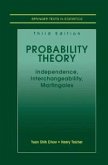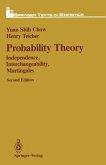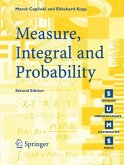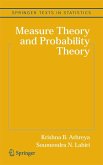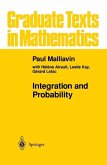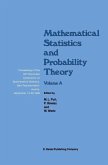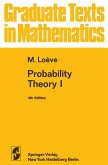J. C. Taylor
An Introduction to Measure and Probability (eBook, PDF)
60,95 €
inkl. MwSt.
Sofort per Download lieferbar

30 °P sammeln
J. C. Taylor
An Introduction to Measure and Probability (eBook, PDF)
- Format: PDF
- Merkliste
- Auf die Merkliste
- Bewerten Bewerten
- Teilen
- Produkt teilen
- Produkterinnerung
- Produkterinnerung

Bitte loggen Sie sich zunächst in Ihr Kundenkonto ein oder registrieren Sie sich bei
bücher.de, um das eBook-Abo tolino select nutzen zu können.
Hier können Sie sich einloggen
Hier können Sie sich einloggen
Sie sind bereits eingeloggt. Klicken Sie auf 2. tolino select Abo, um fortzufahren.

Bitte loggen Sie sich zunächst in Ihr Kundenkonto ein oder registrieren Sie sich bei bücher.de, um das eBook-Abo tolino select nutzen zu können.
Many students in mathematics, statistics, finance, business, and engineering need an introduction to measure theory. This book provides a self-contained introduction that provides students with the mathematical background needed to study applications in their areas.
- Geräte: PC
- ohne Kopierschutz
- eBook Hilfe
- Größe: 42.59MB
Andere Kunden interessierten sich auch für
![Probability Theory (eBook, PDF) Probability Theory (eBook, PDF)]() Yuan Shih ChowProbability Theory (eBook, PDF)52,95 €
Yuan Shih ChowProbability Theory (eBook, PDF)52,95 €![Probability Theory (eBook, PDF) Probability Theory (eBook, PDF)]() Yuan S. ChowProbability Theory (eBook, PDF)40,95 €
Yuan S. ChowProbability Theory (eBook, PDF)40,95 €![Measure, Integral and Probability (eBook, PDF) Measure, Integral and Probability (eBook, PDF)]() Marek CapinskiMeasure, Integral and Probability (eBook, PDF)28,95 €
Marek CapinskiMeasure, Integral and Probability (eBook, PDF)28,95 €![Measure Theory and Probability Theory (eBook, PDF) Measure Theory and Probability Theory (eBook, PDF)]() Krishna B. AthreyaMeasure Theory and Probability Theory (eBook, PDF)72,95 €
Krishna B. AthreyaMeasure Theory and Probability Theory (eBook, PDF)72,95 €![Integration and Probability (eBook, PDF) Integration and Probability (eBook, PDF)]() Paul MalliavinIntegration and Probability (eBook, PDF)52,95 €
Paul MalliavinIntegration and Probability (eBook, PDF)52,95 €![Mathematical Statistics and Probability Theory (eBook, PDF) Mathematical Statistics and Probability Theory (eBook, PDF)]() Mathematical Statistics and Probability Theory (eBook, PDF)112,95 €
Mathematical Statistics and Probability Theory (eBook, PDF)112,95 €![Probability Theory I (eBook, PDF) Probability Theory I (eBook, PDF)]() M. LoeveProbability Theory I (eBook, PDF)48,95 €
M. LoeveProbability Theory I (eBook, PDF)48,95 €-
-
-
Many students in mathematics, statistics, finance, business, and engineering need an introduction to measure theory. This book provides a self-contained introduction that provides students with the mathematical background needed to study applications in their areas.
Dieser Download kann aus rechtlichen Gründen nur mit Rechnungsadresse in A, B, BG, CY, CZ, D, DK, EW, E, FIN, F, GR, HR, H, IRL, I, LT, L, LR, M, NL, PL, P, R, S, SLO, SK ausgeliefert werden.
Produktdetails
- Produktdetails
- Verlag: Springer US
- Seitenzahl: 324
- Erscheinungstermin: 6. Dezember 2012
- Englisch
- ISBN-13: 9781461206590
- Artikelnr.: 44052215
- Verlag: Springer US
- Seitenzahl: 324
- Erscheinungstermin: 6. Dezember 2012
- Englisch
- ISBN-13: 9781461206590
- Artikelnr.: 44052215
- Herstellerkennzeichnung Die Herstellerinformationen sind derzeit nicht verfügbar.
I. Probability Spaces.- 1. Introduction to ?.- 2. What is a probability space? Motivation.- 3. Definition of a probability space.- 4. Construction of a probability from a distribution function.- 5. Additional exercises*.- II. Integration.- 1. Integration on a probability space.- 2. Lebesgue measure on ? and Lebesgue integration.- 3. The Riemann integral and the Lebesgue integral.- 4. Probability density functions.- 5. Infinite series again.- 6. Differentiation under the integral sign.- 7. Signed measures and the Radon-Nikodym theorem*.- 8. Signed measures on ? and functions of bounded variation*.- 9. Additional exercises*.- III. Independence and Product Measures.- 1. Random vectors and Borel sets in ?n.- 2. Independence.- 3. Product measures.- 4. Infinite products.- 5. Some remarks on Markov chains*.- 6. Additional exercises*.- IV. Convergence of Random Variables and Measurable Functions.- 1. Norms for random variables and measurable functions.- 2. Continuous functions and Lp*.- 3. Pointwise convergence and convergence in measure or probability.- 4. Kolmogorov's inequality and the strong law of large numbers.- 5. Uniform integrability and truncation*.- 6. Differentiation: the Hardy-Littlewood maximal function*.- 7. Additional exercises*.- V. Conditional Expectation and an Introduction to Martingales.- 1. Conditional expectation and Hilbert space.- 2. Conditional expectation.- 3. Sufficient statistics*.- 4. Martingales.- 5. An introduction to martingale convergence.- 6. The three-series theorem and the Doob decomposition.- 7. The martingale convergence theorem.- VI. An Introduction to Weak Convergence.- 1. Motivation: empirical distributions.- 2. Weak convergence of probabilities: equivalent formulations.- 3. Weak convergence of random variables.- 4.Empirical distributions again: the Glivenko-Cantelli theorem.- 5. The characteristic function.- 6. Uniqueness and inversion of the characteristic function.- 7. The central limit theorem.- 8. Additional exercises*.- 9. Appendix*.
I. Probability Spaces.- 1. Introduction to ?.- 2. What is a probability space? Motivation.- 3. Definition of a probability space.- 4. Construction of a probability from a distribution function.- 5. Additional exercises*.- II. Integration.- 1. Integration on a probability space.- 2. Lebesgue measure on ? and Lebesgue integration.- 3. The Riemann integral and the Lebesgue integral.- 4. Probability density functions.- 5. Infinite series again.- 6. Differentiation under the integral sign.- 7. Signed measures and the Radon-Nikodym theorem*.- 8. Signed measures on ? and functions of bounded variation*.- 9. Additional exercises*.- III. Independence and Product Measures.- 1. Random vectors and Borel sets in ?n.- 2. Independence.- 3. Product measures.- 4. Infinite products.- 5. Some remarks on Markov chains*.- 6. Additional exercises*.- IV. Convergence of Random Variables and Measurable Functions.- 1. Norms for random variables and measurable functions.- 2. Continuous functions and Lp*.- 3. Pointwise convergence and convergence in measure or probability.- 4. Kolmogorov's inequality and the strong law of large numbers.- 5. Uniform integrability and truncation*.- 6. Differentiation: the Hardy-Littlewood maximal function*.- 7. Additional exercises*.- V. Conditional Expectation and an Introduction to Martingales.- 1. Conditional expectation and Hilbert space.- 2. Conditional expectation.- 3. Sufficient statistics*.- 4. Martingales.- 5. An introduction to martingale convergence.- 6. The three-series theorem and the Doob decomposition.- 7. The martingale convergence theorem.- VI. An Introduction to Weak Convergence.- 1. Motivation: empirical distributions.- 2. Weak convergence of probabilities: equivalent formulations.- 3. Weak convergence of random variables.- 4.Empirical distributions again: the Glivenko-Cantelli theorem.- 5. The characteristic function.- 6. Uniqueness and inversion of the characteristic function.- 7. The central limit theorem.- 8. Additional exercises*.- 9. Appendix*.

